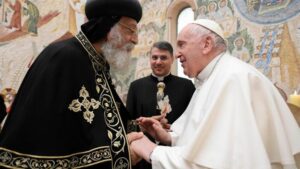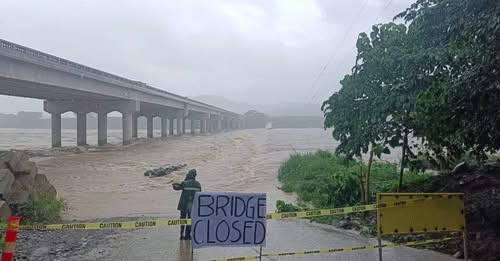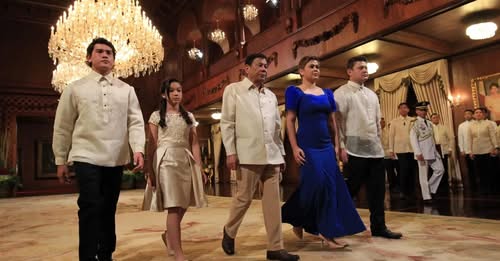📷: Vatican Media
The Ecumenical Bishops Forum (EBF) has extended its message of solidarity to the Roman Catholic Church as it mourns the demise of Pope Francis. In a statement issued of April 22, EBF national coordinator Ofelia A. Cantor said the forum acknowledges the legacy of love and compassion of Pope Francis.
“A shepherd of compassion, humility, and unwavering faith, Pope Francis spent his life at the service of others and to the message of love, mercy, and unity. He was a shepherd whose heart beat for the most vulnerable among us, a voice of compassion in a world increasingly divided, a servant who walked humbly with God. He once said, ‘The name of God is Mercy.’ In his true life, he lived out what mercy is by his own actions. His life and legacy touched people everywhere: His pursuit of peace, justice, and dignity for all people—no matter their race, creed or background—made the world a better place. In tumultuous times of division and uncertainty, he was a voice of conscience, a beacon of hope, an unwavering defender of the downtrodden and dispossessed,” EBF stressed..
EBF is a fellowship of bishops from the United Church of Christ in the Philippines (UCCP), United Methodist Church (UMC), Ang Iglesia Metodista sa Pilipinas (AIMP), Episcopal Church in the Philippines (ECP), Iglesia Filipina Independiente (IFI), and the Roman Catholic Churches in the Philippines. The statement was signed by the following: Bishop Joseph G. Agpaoa, UCCP, EBF co-chairperson; the Rt. Rev. Nestor G. Poltic, Sr., prime bishop, Episcopal Church in the Philippines (ECP), EBF co-chairperson; Bishop Ciriaco Q. Francisco (Ret.), UMC, general secretary, EBF; Bishop Ruby-Nell M. Estrella, UMC, EBF treasurer; the Rt. Rev. Emelyn G. Dacuycuy, Iglesia Filipina Independiente (IFI), auditor, EBF, and; Bishop Emeritus Deogracias S. Iñiguez, Jr., D.D., Roman Catholic Church (RCC), member-at-large, EBF.
“His entire life has been devoted to service of the Lord and His Church. He has taught us to approach the principles of the Gospel with fairness, courage and real charity. We ask for the perpetual repose of his soul, and we surrender him with profound thanksgiving for his examples as a true Disciple of the Lord Jesus to the infinitely merciful love of our One and Triune God. We call on the people of the Philippines to internalize, live out, and embody the truly liberating aspects of the Pope’s life and teachings,” the EBF message said. Our thoughts and prayers are with the Catholic community and all who drew hope and strength from his words and deeds. May his spirit always lead us to a more just, compassionate and united world. May Pope Francis rest in peace in eternity. Your light will still shine,” EBF concluded.
Despite failing health, Pope Francis still made a public appearance on Easter to bless the faithful, boarded his Popemobile and shook the hands of pilgrims as Christendom celebrated the resurrection of Jesus Christ. His representative also met with US Vice President JD Vance to tackle the issue of ethics and morality in governance. The following day, at 7:35 a.m., Vatican time, the Pope expired, less than a week after being discharged from the hospital where he battled double pneumonia. Pope Francis institute reforms are the Vatican, defrocked priests and cardinals accused of sexual and financial abuses, elevated women to significant Vatican positions and overhauled offices engaged in humanitarian work. He acknowledged the errors committed by the clergy in many jurisdictions and dismantled affiliated charitable groups that covered up abuses.
Pope Francis allowed blessings for civil unions in the LGBTQ community and was tolerant of homosexuals, lesbians and others. In July 2013, he loosened the shackles that bound many Catholics to be averse to homosexuals. “If a person is gay and seeks God and has goodwill — who am I to judge?” he told journalists on board the papal plane, heralding a new pastoral tone without rewriting doctrine, wrote one commentator. It was a most welcome remark among many Catholic homosexuals, along with priests who got married and women who have been clamoring for women to be ordained as priests.
As a young priest in his native Argentina, he had to confront an abusive military dictatorship, reflected on the theology of liberation promoted by Gustavo Gutierrez and saw the need to promote social justice and the gospel among the abused, the marginalized and those compelled to take up arms to defend themselves against fascist dictators in Latin America. With winds of change blowing at the Vatican, one is reminded of the a quote from the Methodist preacher, the Rev. John Wesley, who said: “What one generation tolerates, the next generation will embrace.” The late Pontiff dismantled walls and turned them into bridges, like what the eminent American lawyer Angela Davis said as she fought for the unjustly imprisoned Soledad Brothers.
He did not mind offending the conservatives in the Roman Curia who wanted China to follow the Vatican’s bidding in appointing Chinese cardinals. Pope Francis secured an agreement with Beijing to protect Chinese Catholics while diminishing state control over religious affairs. In one of his earliest statements, Pope Francis said: “The thing the Church needs most today is the ability to heal wounds … I see the Church as a field hospital after battle.” This much was said as his papacy grappled with the conservatives, those who wanted to resurrect the Tridentine Mass and those who abhor the progressive wing of the church hierarchy. Yet, Pope Francis reserved his intense criticism against the scourge of human trafficking, explaining: “Human trafficking is an open wound on the body of contemporary society … a crime against humanity.” A strong message, indeed, that there is now a move to consider modern slavery as a truly a crime against humankind, as worse as genocide and mass murder. (DIEGO MORRA)




